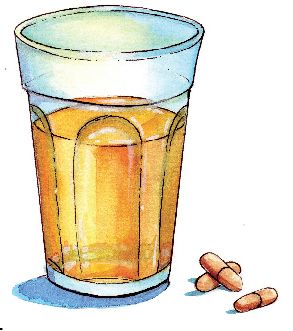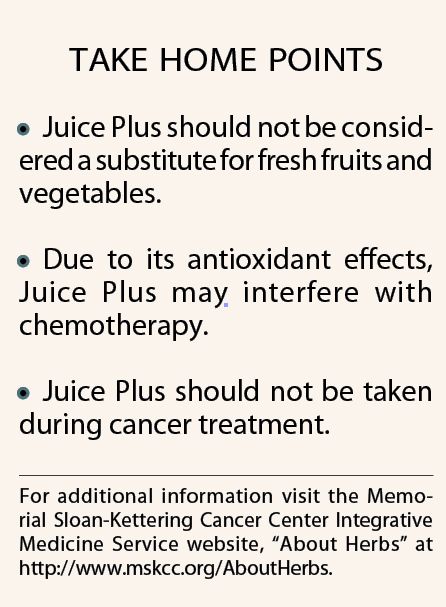Juice Plus
Despite the widespread perception that dietary supplements are safe, few products have been subjected to rigorous research. The potential risks of dietary supplement use are not known. A powdered blend of fruits, vegetables, and grains, Juice Plus is aggressively promoted to cancer patients based on claims of antioxidant effects. Current research evidence indicates that the potential risks of antioxidants outweigh the benefits in the context of cancer treatment. Patients should discuss antioxidant supplementation with their physicians.
Despite the widespread perception that dietary supplements are safe, few products have been subjected to rigorous research. The potential risks of dietary supplement use are not known.
A powdered blend of fruits, vegetables, and grains, Juice Plus is aggressively promoted to cancer patients based on claims of antioxidant effects. Current research evidence indicates that the potential risks of antioxidants outweigh the benefits in the context of cancer treatment. Patients should discuss antioxidant supplementation with their physicians.
Juice Plus is not a substitute for fresh fruits and vegetables.
TREATMENT: Juice Plus

ALSO KNOWN AS: Juice Plus+®
BACKGROUND: Juice Plus, a formulation derived from a variety of fruits, vegetables, and grains, is marketed in capsule form to complement daily diet based on the notion that people do not consume enough fruits and vegetables.
Despite lack of conclusive evidence regarding efficacy and safety, Juice Plus is heavily promoted to cancer patients. Due to its antioxidant effects, Juice Plus may interfere with the actions of some chemotherapeutic agents. Cancer patients should discuss use of this and any dietary supplement with an oncology professional.
RESEARCH: A few studies involving human subjects showed that Juice Plus reduced oxidative stress and DNA damage.[1-3] It also increased serum levels of alpha-carotene, vitamin C, and folate.[3,4] Studies with other markers, such as lutein and alpha-tocopherol, yielded mixed results.
Juice Plus decreased plasma homocysteine levels, a risk factor for cardiovascular disease in two studies,[4-6] but these results were not reproducible.[6] Studies of cardiovascular effects, such as changes in blood pressure and cholesterol levels, are inconclusive.[6,7]

Juice Plus was shown to be comparable to standard vitamin C and E supplements in reducing exercise-induced oxidative stress, via attenuating the rise of protein carbonyls, a biomarker of oxidative stress.[8]
ADVERSE EFFECTS:
Gastrointestinal distress[7] and hive-like rash[9] were reported in clinical studies.
HERB-DRUG INTERACTIONS: Because of its antioxidant potential, Juice Plus should not be taken during cancer treatment.
Although more research is needed to determine the association between antioxidant intake and cancer, current evidence indicates that the potential risks of antioxidants outweigh the benefits when taken during cancer treatment.[10] Analyses of data from several randomized clinical trials concluded that antioxidants, previously thought to protect healthy cells from side effects of cancer treatments, also protect tumor cells, thereby decreasing the efficacy of cancer treatment.[10]
References:
1. Smith MJ et al: Supplementation with fruit and vegetable extracts may decrease DNA damage in the peripheral lymphocytes on an elderly population. Nutr Res 19:1507-1518, 1999.
2. Lamprecht M et al: Several indicators of oxidative stress, immunity, and illness improved in trained men consuming an encapsulated juice powder concentrate for 28 weeks. J Nutr 137:2737-2741, 2007.
3. Kawashima A et al: Four week supplementation with mixed fruit and vegetable juice concentrates increased protective serum antioxidants and folate and decreased plasma homocysteine in Japanese subjects. Asia Pac J Clin Nutr 16:411-421, 2007.
4. Samman S et al: A mixed fruit and vegetable concentrate increases plasma antioxidant vitamins and folate and lowers plasma homocysteine in men.J Nutr 133:2188-2193, 2003.
5. Panunzio MF et al: Supplementation with fruit and vegetable concentrate decreases plasma homocysteine levels in a dietary controlled trial. Nutr Res 23:1221-1228, 2003.
6. Plotnick GD et al: Effect of supplemental phytonutrients on impairment of the flow-mediated brachial artery vasoactivity after a single high-fat meal. J Am Coll Cardiol 41:1744-1749, 2003.
7. Houston MC, et al: Juice powder concentrate and systemic blood pressure, progression of coronary artery calcium and antioxidant status in hypertensive subjects: A pilot study. Evid Based Complement Alternat Med 4:455-462, 2007.
8. Bloomer RJ et al: Oxidative stress response to aerobic exercise: Comparison of antioxidant supplements. Med Sci Sports Exerc 38:1098-1105, 2006.
9. Inserra PF et al: Immune function in elderly smokers and nonsmokers improves during supplementation with fruit and vegetable extracts. Integr Med 2:3-10, 1999.
10. Lawenda BD et al: Should supplemental antioxidant administration be avoided during chemotherapy and radiation therapy? J Natl Cancer Inst 100:773-783, 2008.